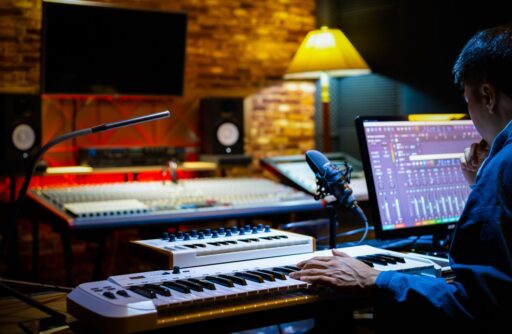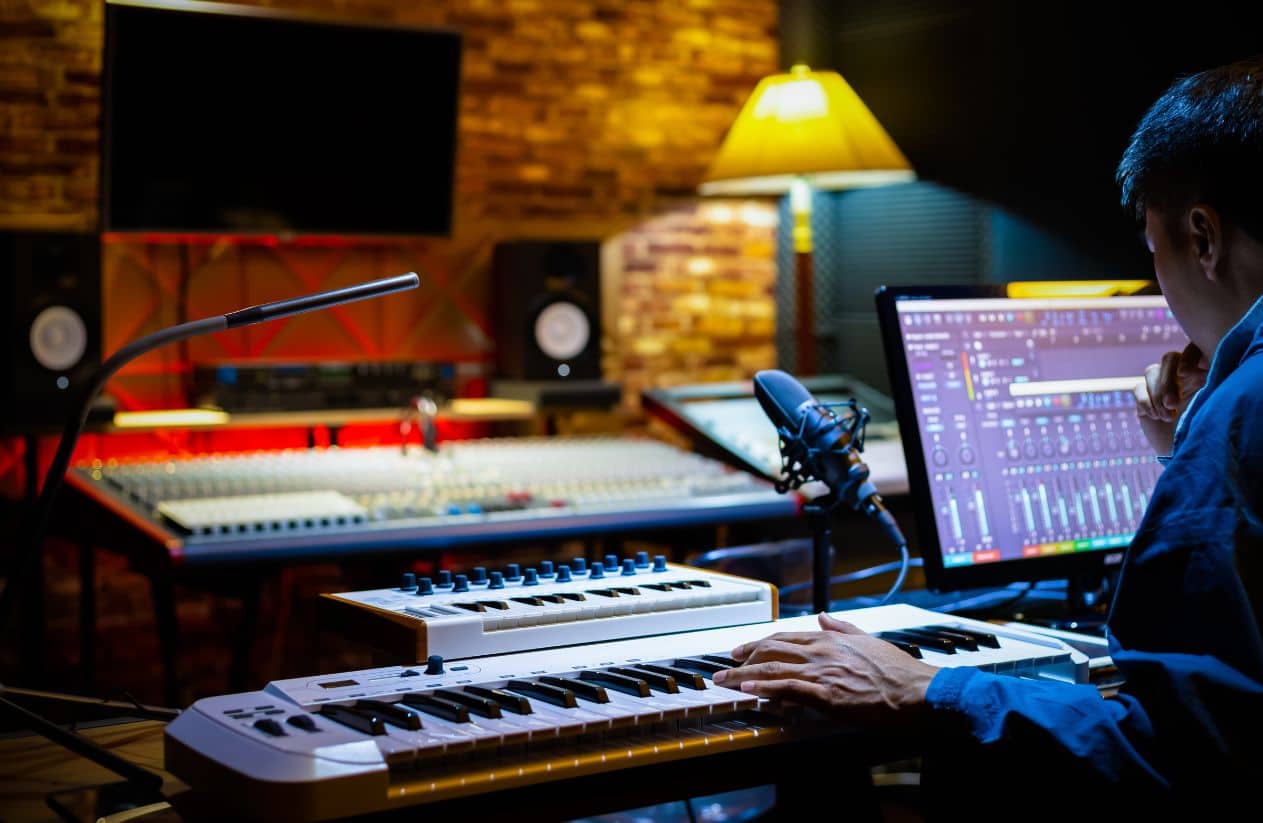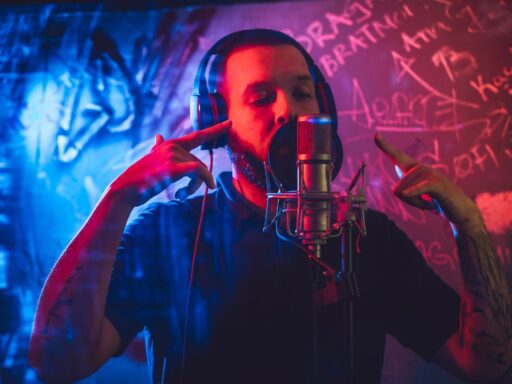Table of Contents
Embrace the Learning Curve: Educating Yourself on Music Production
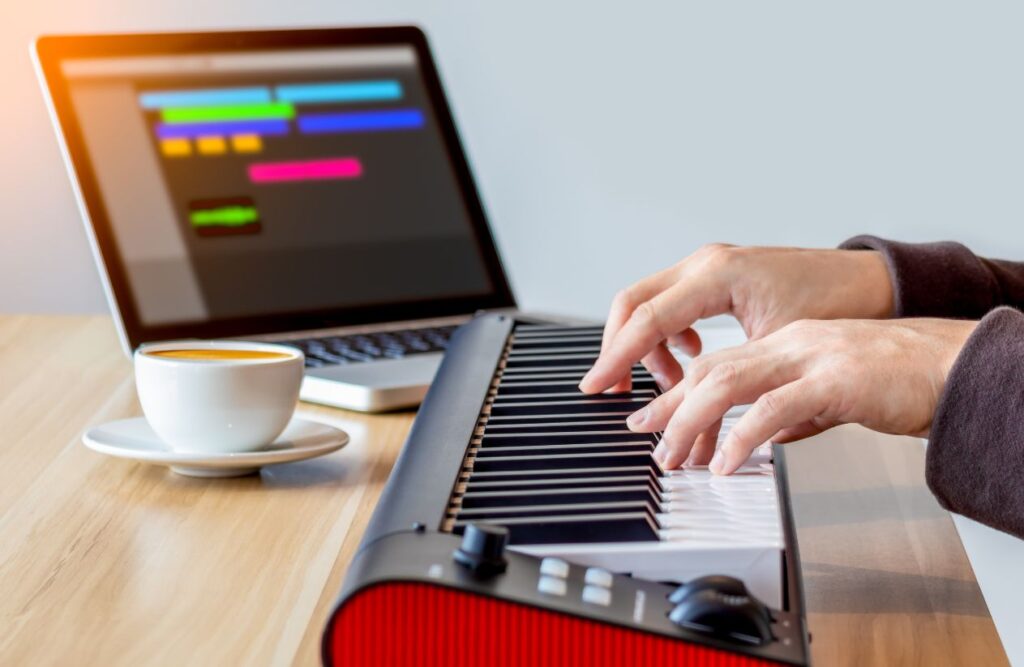
Diving into the world of music production from a solid DJ background opens an expansive horizon of creative possibilities.
While thrilling, the journey can often seem daunting at first, given the breadth of knowledge and skills required.
However, embracing this learning curve as a crucial step towards evolving from DJing to music production can be both rewarding and transformative.
Starting with the Basics
The transition begins with a foundational understanding of music production. This involves familiarizing oneself with the fundamental tools and software (DAWs – Digital Audio Workstations) used in producing music.
Many DJs already possess a keen ear for music, which is an invaluable skill in production.
The key lies in extending this understanding to aspects like sound design, arrangement, and mixing.
There are plenty of resources available online, including tutorials, courses, and forums, where one can start learning these basics.
Investing time in mastering your DAW of choice, and understanding its ins and outs, will pay dividends in your music production journey.
Experimentation is Key
Transitioning from DJing to production isn’t just about learning the technical aspects; it’s also about cultivating creativity.
Experimentation plays a crucial role in finding your unique sound as a producer. This might involve blending genres you’re passionate about, or even incorporating elements from tracks you admire into your projects.
Don’t be afraid to spend hours tweaking knobs, trying out different sounds, or rearranging segments of your tracks.
These experiments, although they might not always lead to satisfactory results, are essential learning experiences that will gradually improve your production skills.
Learning from the Pros
Even though self-teaching is a significant part of this journey, seeking mentorship or learning from professionals can exponentially speed up your progress.
Many established music producers offer workshops, online courses, and one-on-one coaching sessions.
Participating in these educational opportunities provides insights into industry standards, production techniques, and the business side of music production.
Additionally, constructive feedback from seasoned producers can help in refining your work, steering you away from common beginner mistakes, and aiding in honing your craft to a professional level.
Embarking on the path from a professional DJ to becoming a music producer is an exhilarating adventure filled with learning opportunities.
By embracing the learning curve, starting with the basics, experimenting fearlessly, and learning from the pros, you gradually shift closer to mastering the art and science of music production.
This journey not only expands your creative expression but also opens up new avenues for career growth and personal fulfillment within the music industry.
Invest in the Right Equipment: Building Your Home Studio
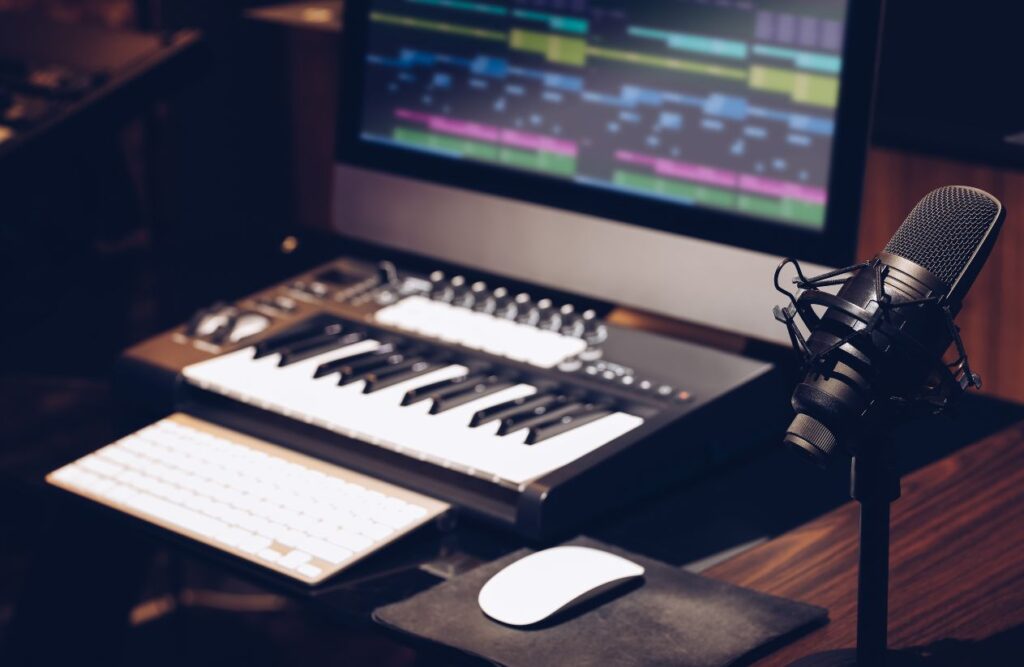
As someone who has journeyed from being a professional DJ, performing at numerous venues, concerts, and corporate events, to producing my own music, I’ve learned firsthand the importance of equipping oneself with the right tools.
Transitioning to music production requires not only a shift in mindset but also a significant upgrade in equipment.
Choosing Your Core Equipment
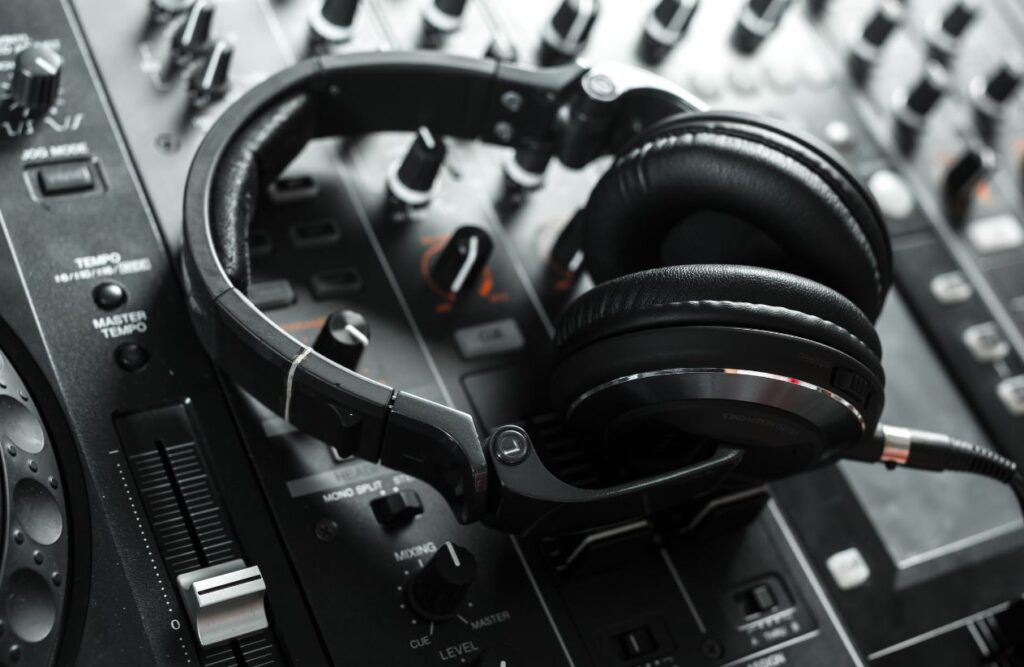
The foundation of any home studio is your Digital Audio Workstation (DAW). This software will be at the heart of everything you create, so choose one that aligns with your workflow and creative preferences.
As a DJ, you might be drawn to DAWs that offer intuitive beat-making and sampling features.
Pair your DAW with a reliable computer that can handle high processing loads without lagging, ensuring a seamless production process.
Next, invest in a high-quality audio interface. This piece of hardware is crucial for recording crisp vocals and instruments, and it significantly improves playback quality.
Look for interfaces with low latency and multiple inputs, giving you the flexibility to record various sources simultaneously.
Enhancing Your Setup
Good studio monitors are indispensable. Unlike standard speakers, studio monitors provide flat frequency response, allowing you to hear your productions as they truly sound, without added coloration.
This accuracy is vital for making precise adjustments and ensuring your tracks sound great on all playback systems.
Additionally, a set of studio headphones is essential for detailed mixing and editing, especially in environments where using monitors might not be feasible.
Look for headphones that offer a wide frequency range and comfortable fit for long sessions.
Specialized Equipment for Production
As you delve deeper into music production, you’ll discover the value of specialized equipment.
MIDI controllers and synthesizers can significantly expand your creative palette, allowing for hands-on control and the creation of unique sounds that can set your music apart.
Investing in a good microphone is also critical if you’re working with vocalists or recording live instruments.
Consider the types of recordings you plan to do and select a microphone that suits those needs, whether it’s a versatile large-diaphragm condenser microphone or a dynamic microphone for louder sources.
Transitioning from DJing to music production is an exciting journey that opens up new avenues for creative expression.
By investing in the right equipment for your home studio, you ensure a smooth transition and set the stage for exploring the depths of your musical potential.
Create Your Unique Sound: Experimentation and Genre Exploration
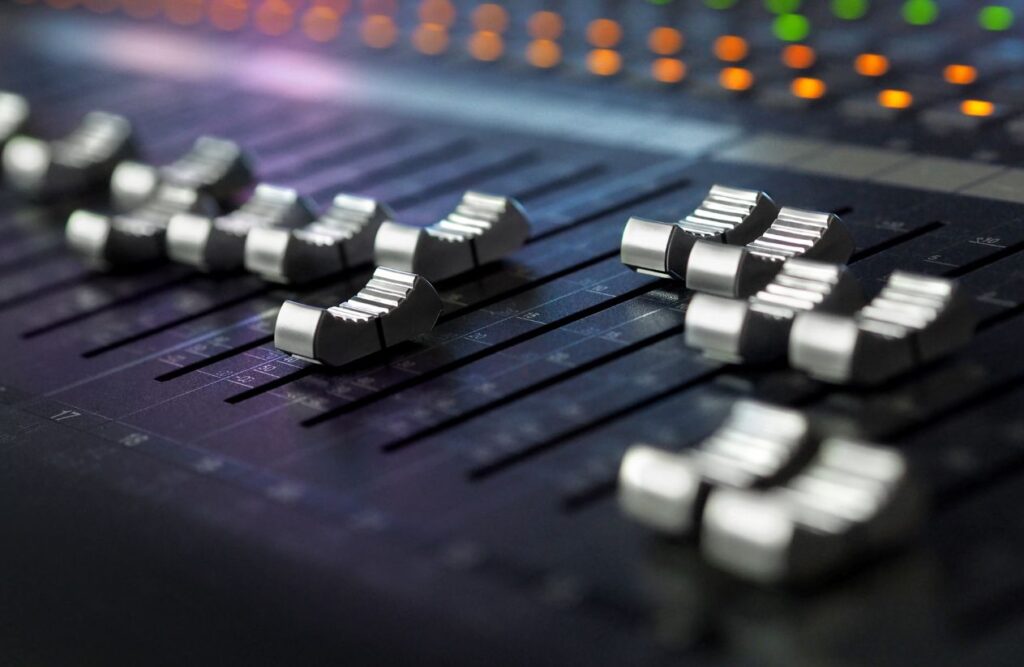
Embarking on the journey from a professional DJ to a music producer demands not only technical skills but also a unique artistic voice.
This transition involves a deep dive into experimentation and genre exploration to carve out a distinct sound that sets you apart from others.
As someone who has navigated this path successfully, performing at a myriad of venues, concerts, and corporate events, the leap into music production was propelled by the desire to create rather than just curate.
Fostering Creativity through Experimentation
The first step in defining your unique sound is to allow yourself the freedom to experiment.
This involves playing with different beats, rhythms, and melodies without the constraint of sticking strictly to what’s popular or expected.
Utilizing digital audio workstations (DAWs) offers limitless opportunities to twist and fuse sounds, introducing a playground for creativity.
Remember, every iconic producer once started with a blank canvas, experimenting with sounds until they stumbled upon something groundbreaking.
Your experiments are not just about finding what works but also discovering what resonates with you personally. This process is instrumental in developing a sound that truly represents your artistic identity.
Navigating Through Genres
As a DJ, you’re already acquainted with a wide range of musical genres, a familiarity that serves as a fertile ground for your production endeavors.
The trick lies in not just understanding these genres but exploring their depths and intersections creatively.
For instance, blending elements of electronic music with traditional folk sounds can yield a fascinating new genre.
This genre exploration isn’t just about mixing and matching different styles; it’s about understanding the soul of the music and reinterpreting it in a way that speaks to both you and your audience.
It’s a delicate balance between maintaining the integrity of the original genre and introducing your unique spin.
Embracing Your Evolution
Transitioning from DJing to producing is an evolutionary process that demands patience and persistence.
Your unique sound won’t emerge overnight. It will evolve as you do, growing richer and more refined with each track you produce.
Keeping an open mind and being willing to adapt are crucial components of this journey.
As you evolve, so will your music, reflecting your experiences, influences, and the sheer breadth of your creativity. Embrace this evolution as it’s not just about creating music; it’s about crafting your legacy.
In essence, creating your unique sound as you shift from DJ to music producer involves an intricate balance of experimentation, genre exploration, and personal evolution.
It’s a journey that requires not just technical skill but also a deep connection with your creative self.
By fostering innovation, navigating through genres with curiosity and openness, and embracing your personal growth, you pave the way for not just a sound that is uniquely yours, but a distinguished career in music production.
Network and Collaborate: Expanding Your Circle in the Music Industry

Bridging the gap between being a DJ and a music producer involves not just skill expansion but significantly growing your network within the music industry.
This journey necessitates collaboration, learning from the experiences of others, and leveraging connections to tap into new opportunities.
Forge Meaningful Connections
In the transition from DJing to producing, relationships you’ve cultivated over the years become invaluable.
Attend industry networking events, music conferences, and even social gatherings that are frequented by music professionals.
Use these opportunities not only to meet new people but also to deepen your relationships with those you already know.
Remember, genuine connections are about quality, not quantity. Engage in meaningful conversations where you can share your aspirations and listen to others’ experiences and advice.
Collaborate to Learn and Grow
One of the most effective ways to learn music production is through collaboration. Seek out other producers who are willing to co-create music or allow you to sit in on their sessions.
This could be an opportunity to learn new techniques, get feedback on your work, and understand the business side of music production.
Collaboration doesn’t always mean working with more experienced producers; peers and even those newer to the field can offer fresh perspectives and ideas that can inspire your own work.
Utilize Social Media and Online Platforms
Social media and various online platforms have revolutionized the way musicians and producers connect and collaborate.
Create content regularly to showcase your journey from DJing to producing. Engage with your audience and fellow producers by commenting on their posts, sharing valuable insights, and participating in online communities related to music production.
Additionally, platforms like SoundCloud, Bandcamp, and even Instagram can be excellent places to discover collaborators, share your work, and get noticed by industry professionals who can help propel your career forward.
By actively networking and collaborating, you create a supportive ecosystem that fosters growth, learning, and opportunities in your transition from a professional DJ to a music producer.
Transition from DJ to Music Producer- Frequently Ask Questions
Navigating the transition from being a professional DJ to becoming a music producer can raise many questions.
While both roles thrive on a deep love for music, they require different sets of skills and mindsets.
Here, we address some common queries that aspiring music producers may have as they embark on this journey.
Do I Need to Learn to Play an Instrument?
While not required, learning an instrument can help you compose better music. Many producers eventually learn an instrument to expand their skills.
How Much Should I Invest in Music Production Software?
There are free and affordable options to get you started. As your needs grow, you can invest in more advanced software. Remember, it’s your skill, not the price of your tools, that matters most.
Can My DJ Experience Benefit My Music Production Journey?
Yes! Your DJ experience gives you valuable insights into song structure, crowd response, and how to make tracks that work on the dancefloor. This knowledge gives you a unique advantage as a producer.
